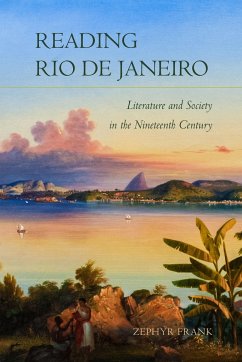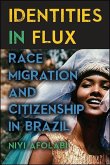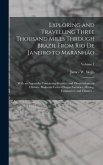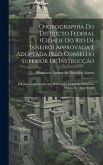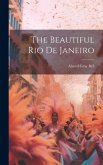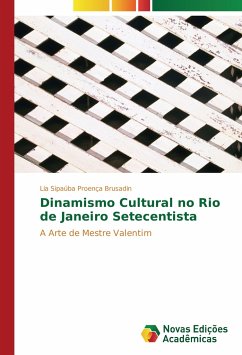- Gebundenes Buch
- Merkliste
- Auf die Merkliste
- Bewerten Bewerten
- Teilen
- Produkt teilen
- Produkterinnerung
- Produkterinnerung
Zephyr L. Frank is Professor of History at Stanford University. He is the author of Dutra's World: Wealth and Family in Nineteenth-Century Rio de Janeiro.
Andere Kunden interessierten sich auch für
![Identities in Flux Identities in Flux]() Niyi AfolabiIdentities in Flux104,99 €
Niyi AfolabiIdentities in Flux104,99 €![Exploring and Travelling Three Thousand Miles Through Brazil From Rio de Janeiro to Maranhão Exploring and Travelling Three Thousand Miles Through Brazil From Rio de Janeiro to Maranhão]() James W WellsExploring and Travelling Three Thousand Miles Through Brazil From Rio de Janeiro to Maranhão40,99 €
James W WellsExploring and Travelling Three Thousand Miles Through Brazil From Rio de Janeiro to Maranhão40,99 €![Fastos Do Museu Nacional Do Rio De Janeiro Fastos Do Museu Nacional Do Rio De Janeiro]() João Baptista de LacerdaFastos Do Museu Nacional Do Rio De Janeiro34,99 €
João Baptista de LacerdaFastos Do Museu Nacional Do Rio De Janeiro34,99 €![Chorographia Do Districto Federal (cidade Do Rio De Janeiro) Approvada E Adoptada Pelo Conselho Superior De Instrucção: Edição Consideravelmente Melho Chorographia Do Districto Federal (cidade Do Rio De Janeiro) Approvada E Adoptada Pelo Conselho Superior De Instrucção: Edição Consideravelmente Melho]() Chorographia Do Districto Federal (cidade Do Rio De Janeiro) Approvada E Adoptada Pelo Conselho Superior De Instrucção: Edição Consideravelmente Melho40,99 €
Chorographia Do Districto Federal (cidade Do Rio De Janeiro) Approvada E Adoptada Pelo Conselho Superior De Instrucção: Edição Consideravelmente Melho40,99 €![Voyage Dans Les Provinces De Rio De Janeiro Et De Minas Geraes Voyage Dans Les Provinces De Rio De Janeiro Et De Minas Geraes]() Auguste De Saint-HilaireVoyage Dans Les Provinces De Rio De Janeiro Et De Minas Geraes41,99 €
Auguste De Saint-HilaireVoyage Dans Les Provinces De Rio De Janeiro Et De Minas Geraes41,99 €![The Beautiful Rio de Janeiro The Beautiful Rio de Janeiro]() Alured Gray BellThe Beautiful Rio de Janeiro40,99 €
Alured Gray BellThe Beautiful Rio de Janeiro40,99 €![Dinamismo Cultural no Rio de Janeiro Setecentista Dinamismo Cultural no Rio de Janeiro Setecentista]() Lia Sipaúba Proença BrusadinDinamismo Cultural no Rio de Janeiro Setecentista21,99 €
Lia Sipaúba Proença BrusadinDinamismo Cultural no Rio de Janeiro Setecentista21,99 €-
-
-
Zephyr L. Frank is Professor of History at Stanford University. He is the author of Dutra's World: Wealth and Family in Nineteenth-Century Rio de Janeiro.
Hinweis: Dieser Artikel kann nur an eine deutsche Lieferadresse ausgeliefert werden.
Hinweis: Dieser Artikel kann nur an eine deutsche Lieferadresse ausgeliefert werden.
Produktdetails
- Produktdetails
- Verlag: Stanford University Press
- Seitenzahl: 248
- Erscheinungstermin: 6. Januar 2016
- Englisch
- Abmessung: 231mm x 155mm x 18mm
- Gewicht: 476g
- ISBN-13: 9780804757447
- ISBN-10: 0804757445
- Artikelnr.: 42798862
- Herstellerkennzeichnung
- Libri GmbH
- Europaallee 1
- 36244 Bad Hersfeld
- gpsr@libri.de
- Verlag: Stanford University Press
- Seitenzahl: 248
- Erscheinungstermin: 6. Januar 2016
- Englisch
- Abmessung: 231mm x 155mm x 18mm
- Gewicht: 476g
- ISBN-13: 9780804757447
- ISBN-10: 0804757445
- Artikelnr.: 42798862
- Herstellerkennzeichnung
- Libri GmbH
- Europaallee 1
- 36244 Bad Hersfeld
- gpsr@libri.de
Zephyr L. Frank is Professor of History at Stanford University. He is the author of Dutra's World: Wealth and Family in Nineteenth-Century Rio de Janeiro.
Contents and Abstracts
1Sonhos d'Ouro
chapter abstract
This chapter describes and analyzes the novel Sonhos d'Ouro, by José de
Alencar. Drawing on literary and social history, the chapter explores the
characters and settings in this important novel in order to uncover
Alencar's distinctive vision for social integration and the reconciliation
of metropolitan wealth and provincial virtue. The character of Guida Soares
is shown to represent the caprice and, concomitantly, the latent potential
goodness inherent in capital honestly accumulated; her counterpart, Ricardo
Nunes, is understood as Alencar's proxy for a virtuous and idealistic young
man from the provinces. Together, their story represents a version of
Bildung wherein an alternative mode of social integration is made possible.
2Memórias Póstumas de Brás Cubas
chapter abstract
This chapter explores the novel Memórias Póstumas de Brás Cubas, by Joaquim
Maria Machado de Assis, from literary and historical perspectives. This
reading of the novel, long considered a masterpiece of world literature,
emphasizes its relation to the literary field in which it was embedded,
within and beyond Brazil, as well as the social historical dimensions of
the urban space therein depicted. The novel is placed into context with
works by Balzac and Flaubert-extending and modifying previous readings that
emphasized its sui generis, Brazilian content. Additionally, the chapter
shows how Brás Cubas can be read alongside Sonhos d'Ouro-highlighting the
different answers to the problem of social integration provided by Machado
de Assis and José de Alencar.
3O Coruja
chapter abstract
This chapter analyzes the novel O Coruja, by Aluísio Azevedo. A more
obscure novel than those discussed in the first two chapters, this work by
Azevedo is also read in both literary and social historical perspective,
allowing for an exploration of the themes of environmental determinism and
social hierarchies in Rio de Janeiro during the 1880s.
4Sentimental Educations
chapter abstract
This chapter develops an interpretation of the problem of the individual
and his or her integration into society. Building upon the foundation laid
in the first three chapters, this analysis engages a broader range of
novels and focuses on the problem of comportment in social settings.
History and social theory combine to offer a reading of nineteenth-century
Brazilian novels that highlight the key milestones and challenges
associated with the growth and development of fictional protagonists,
including the themes of education and career.
5Marriage and Money
chapter abstract
This chapter examines the way marriage and money intersected in
nineteenth-century Rio de Janeiro as depicted in novels and against a
backdrop of social historical data. Using parish records and estate
inventories, the analysis shows how the realistic commitments of
nineteenth-century authors echoed and reproduced an image of social
structure surrounding the critical issues of wealth and family in Rio de
Janeiro.
6Problems of Spatial Practice
chapter abstract
This chapter reads nineteenth-century novels set in Rio de Janeiro in terms
of spatial practices. Through a combination of close and distant reading,
novels are shown to contain detailed scripts referring to spatial practices
ranging from the open spaces of sociability, such as the street and
theater, to the closed spaces of the house. Within these spaces, the
disposition and movement of characters is shown to reflect core aspects of
social reality and the strategic and tactical maneuverings available to
individuals of varied class status, age, and gender.
1Sonhos d'Ouro
chapter abstract
This chapter describes and analyzes the novel Sonhos d'Ouro, by José de
Alencar. Drawing on literary and social history, the chapter explores the
characters and settings in this important novel in order to uncover
Alencar's distinctive vision for social integration and the reconciliation
of metropolitan wealth and provincial virtue. The character of Guida Soares
is shown to represent the caprice and, concomitantly, the latent potential
goodness inherent in capital honestly accumulated; her counterpart, Ricardo
Nunes, is understood as Alencar's proxy for a virtuous and idealistic young
man from the provinces. Together, their story represents a version of
Bildung wherein an alternative mode of social integration is made possible.
2Memórias Póstumas de Brás Cubas
chapter abstract
This chapter explores the novel Memórias Póstumas de Brás Cubas, by Joaquim
Maria Machado de Assis, from literary and historical perspectives. This
reading of the novel, long considered a masterpiece of world literature,
emphasizes its relation to the literary field in which it was embedded,
within and beyond Brazil, as well as the social historical dimensions of
the urban space therein depicted. The novel is placed into context with
works by Balzac and Flaubert-extending and modifying previous readings that
emphasized its sui generis, Brazilian content. Additionally, the chapter
shows how Brás Cubas can be read alongside Sonhos d'Ouro-highlighting the
different answers to the problem of social integration provided by Machado
de Assis and José de Alencar.
3O Coruja
chapter abstract
This chapter analyzes the novel O Coruja, by Aluísio Azevedo. A more
obscure novel than those discussed in the first two chapters, this work by
Azevedo is also read in both literary and social historical perspective,
allowing for an exploration of the themes of environmental determinism and
social hierarchies in Rio de Janeiro during the 1880s.
4Sentimental Educations
chapter abstract
This chapter develops an interpretation of the problem of the individual
and his or her integration into society. Building upon the foundation laid
in the first three chapters, this analysis engages a broader range of
novels and focuses on the problem of comportment in social settings.
History and social theory combine to offer a reading of nineteenth-century
Brazilian novels that highlight the key milestones and challenges
associated with the growth and development of fictional protagonists,
including the themes of education and career.
5Marriage and Money
chapter abstract
This chapter examines the way marriage and money intersected in
nineteenth-century Rio de Janeiro as depicted in novels and against a
backdrop of social historical data. Using parish records and estate
inventories, the analysis shows how the realistic commitments of
nineteenth-century authors echoed and reproduced an image of social
structure surrounding the critical issues of wealth and family in Rio de
Janeiro.
6Problems of Spatial Practice
chapter abstract
This chapter reads nineteenth-century novels set in Rio de Janeiro in terms
of spatial practices. Through a combination of close and distant reading,
novels are shown to contain detailed scripts referring to spatial practices
ranging from the open spaces of sociability, such as the street and
theater, to the closed spaces of the house. Within these spaces, the
disposition and movement of characters is shown to reflect core aspects of
social reality and the strategic and tactical maneuverings available to
individuals of varied class status, age, and gender.
Contents and Abstracts
1Sonhos d'Ouro
chapter abstract
This chapter describes and analyzes the novel Sonhos d'Ouro, by José de
Alencar. Drawing on literary and social history, the chapter explores the
characters and settings in this important novel in order to uncover
Alencar's distinctive vision for social integration and the reconciliation
of metropolitan wealth and provincial virtue. The character of Guida Soares
is shown to represent the caprice and, concomitantly, the latent potential
goodness inherent in capital honestly accumulated; her counterpart, Ricardo
Nunes, is understood as Alencar's proxy for a virtuous and idealistic young
man from the provinces. Together, their story represents a version of
Bildung wherein an alternative mode of social integration is made possible.
2Memórias Póstumas de Brás Cubas
chapter abstract
This chapter explores the novel Memórias Póstumas de Brás Cubas, by Joaquim
Maria Machado de Assis, from literary and historical perspectives. This
reading of the novel, long considered a masterpiece of world literature,
emphasizes its relation to the literary field in which it was embedded,
within and beyond Brazil, as well as the social historical dimensions of
the urban space therein depicted. The novel is placed into context with
works by Balzac and Flaubert-extending and modifying previous readings that
emphasized its sui generis, Brazilian content. Additionally, the chapter
shows how Brás Cubas can be read alongside Sonhos d'Ouro-highlighting the
different answers to the problem of social integration provided by Machado
de Assis and José de Alencar.
3O Coruja
chapter abstract
This chapter analyzes the novel O Coruja, by Aluísio Azevedo. A more
obscure novel than those discussed in the first two chapters, this work by
Azevedo is also read in both literary and social historical perspective,
allowing for an exploration of the themes of environmental determinism and
social hierarchies in Rio de Janeiro during the 1880s.
4Sentimental Educations
chapter abstract
This chapter develops an interpretation of the problem of the individual
and his or her integration into society. Building upon the foundation laid
in the first three chapters, this analysis engages a broader range of
novels and focuses on the problem of comportment in social settings.
History and social theory combine to offer a reading of nineteenth-century
Brazilian novels that highlight the key milestones and challenges
associated with the growth and development of fictional protagonists,
including the themes of education and career.
5Marriage and Money
chapter abstract
This chapter examines the way marriage and money intersected in
nineteenth-century Rio de Janeiro as depicted in novels and against a
backdrop of social historical data. Using parish records and estate
inventories, the analysis shows how the realistic commitments of
nineteenth-century authors echoed and reproduced an image of social
structure surrounding the critical issues of wealth and family in Rio de
Janeiro.
6Problems of Spatial Practice
chapter abstract
This chapter reads nineteenth-century novels set in Rio de Janeiro in terms
of spatial practices. Through a combination of close and distant reading,
novels are shown to contain detailed scripts referring to spatial practices
ranging from the open spaces of sociability, such as the street and
theater, to the closed spaces of the house. Within these spaces, the
disposition and movement of characters is shown to reflect core aspects of
social reality and the strategic and tactical maneuverings available to
individuals of varied class status, age, and gender.
1Sonhos d'Ouro
chapter abstract
This chapter describes and analyzes the novel Sonhos d'Ouro, by José de
Alencar. Drawing on literary and social history, the chapter explores the
characters and settings in this important novel in order to uncover
Alencar's distinctive vision for social integration and the reconciliation
of metropolitan wealth and provincial virtue. The character of Guida Soares
is shown to represent the caprice and, concomitantly, the latent potential
goodness inherent in capital honestly accumulated; her counterpart, Ricardo
Nunes, is understood as Alencar's proxy for a virtuous and idealistic young
man from the provinces. Together, their story represents a version of
Bildung wherein an alternative mode of social integration is made possible.
2Memórias Póstumas de Brás Cubas
chapter abstract
This chapter explores the novel Memórias Póstumas de Brás Cubas, by Joaquim
Maria Machado de Assis, from literary and historical perspectives. This
reading of the novel, long considered a masterpiece of world literature,
emphasizes its relation to the literary field in which it was embedded,
within and beyond Brazil, as well as the social historical dimensions of
the urban space therein depicted. The novel is placed into context with
works by Balzac and Flaubert-extending and modifying previous readings that
emphasized its sui generis, Brazilian content. Additionally, the chapter
shows how Brás Cubas can be read alongside Sonhos d'Ouro-highlighting the
different answers to the problem of social integration provided by Machado
de Assis and José de Alencar.
3O Coruja
chapter abstract
This chapter analyzes the novel O Coruja, by Aluísio Azevedo. A more
obscure novel than those discussed in the first two chapters, this work by
Azevedo is also read in both literary and social historical perspective,
allowing for an exploration of the themes of environmental determinism and
social hierarchies in Rio de Janeiro during the 1880s.
4Sentimental Educations
chapter abstract
This chapter develops an interpretation of the problem of the individual
and his or her integration into society. Building upon the foundation laid
in the first three chapters, this analysis engages a broader range of
novels and focuses on the problem of comportment in social settings.
History and social theory combine to offer a reading of nineteenth-century
Brazilian novels that highlight the key milestones and challenges
associated with the growth and development of fictional protagonists,
including the themes of education and career.
5Marriage and Money
chapter abstract
This chapter examines the way marriage and money intersected in
nineteenth-century Rio de Janeiro as depicted in novels and against a
backdrop of social historical data. Using parish records and estate
inventories, the analysis shows how the realistic commitments of
nineteenth-century authors echoed and reproduced an image of social
structure surrounding the critical issues of wealth and family in Rio de
Janeiro.
6Problems of Spatial Practice
chapter abstract
This chapter reads nineteenth-century novels set in Rio de Janeiro in terms
of spatial practices. Through a combination of close and distant reading,
novels are shown to contain detailed scripts referring to spatial practices
ranging from the open spaces of sociability, such as the street and
theater, to the closed spaces of the house. Within these spaces, the
disposition and movement of characters is shown to reflect core aspects of
social reality and the strategic and tactical maneuverings available to
individuals of varied class status, age, and gender.

